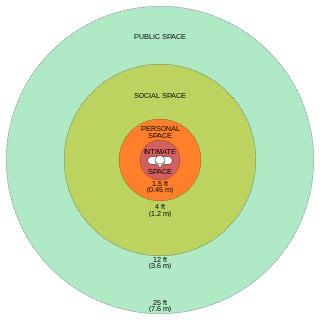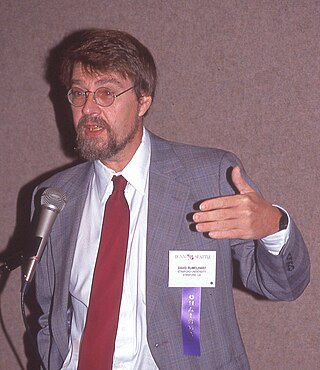
Clyde Hamilton Coombs was an American psychologist specializing in the field of mathematical psychology. He devised a voting system, that was hence named Coombs' method.

In research design, especially in psychology, social sciences, life sciences and physics, operationalization or operationalisation is a process of defining the measurement of a phenomenon which is not directly measurable, though its existence is inferred from other phenomena. Operationalization thus defines a fuzzy concept so as to make it clearly distinguishable, measurable, and understandable by empirical observation. In a broader sense, it defines the extension of a concept—describing what is and is not an instance of that concept. For example, in medicine, the phenomenon of health might be operationalized by one or more indicators like body mass index or tobacco smoking. As another example, in visual processing the presence of a certain object in the environment could be inferred by measuring specific features of the light it reflects. In these examples, the phenomena are difficult to directly observe and measure because they are general/abstract or they are latent. Operationalization helps infer the existence, and some elements of the extension, of the phenomena of interest by means of some observable and measurable effects they have.

Anatol Borisovich Rapoport was an American mathematical psychologist. He contributed to general systems theory, to mathematical biology and to the mathematical modeling of social interaction and stochastic models of contagion.

John Henry Holland was an American scientist and professor of psychology and electrical engineering and computer science at the University of Michigan, Ann Arbor. He was a pioneer in what became known as genetic algorithms.

Betrayal is the breaking or violation of a presumptive contract, trust, or confidence that produces moral and psychological conflict within a relationship amongst individuals, between organizations or between individuals and organizations. Often betrayal is the act of supporting a rival group, or it is a complete break from previously decided upon or presumed norms by one party from the others. Someone who betrays others is commonly known as a traitor or betrayer.

David Everett Rumelhart was an American psychologist who made many contributions to the formal analysis of human cognition, working primarily within the frameworks of mathematical psychology, symbolic artificial intelligence, and parallel distributed processing. He also admired formal linguistic approaches to cognition, and explored the possibility of formulating a formal grammar to capture the structure of stories.
Evolutionary educational psychology is the study of the relation between inherent folk knowledge and abilities and accompanying inferential and attributional biases as these influence academic learning in evolutionarily novel cultural contexts, such as schools and the industrial workplace. The fundamental premises and principles of this discipline are presented below.
The psychology of science is a branch of the studies of social science defined most simply as the study of scientific thought or behavior. It is a collection of studies of various topics. The thought of psychology has been around since the late 19th century. Research on the psychology of science began in 1874, the field has seen a substantial expansion of activity in recent years. The specific field of psychology as a science first gained popularity mostly in the 1960s, with Abraham Maslow publishing an influential text on the subject, but this popularity faded, only re-emerging in the 1980s. Other studies of science include philosophy of science, history of science, and sociology of science or sociology of scientific knowledge.
Edward Steven Reed was an American philosopher of science and an ecological psychologist in the vein of James J. Gibson.
Davi Napoleon, also known as Davida Skurnick and Davida Napoleon, is an American theater historian and critic as well as a freelance feature writer. She is a regular contributor to Live Design, a monthly magazine about entertainment design and designers. She is an expert on the not-for-profit theater in America and author of Chelsea on the Edge: The Adventures of an American Theater. This book is a major study of the economic changes in the American not-for-profit theater and the impact of these on the art produced. She has written on social and political issues as well.
Ze'ev Maoz is a Professor of Political Science and Director of the Correlates of War Project at the University of California, Davis, as well as Distinguished Fellow at the Interdisciplinary Center, Herzliya, Israel. He is the President of the Peace Science Society (International) during 2007-08. Before coming to UC-Davis he was head of the Graduate School of Government and Policy at Tel-Aviv University. He also served as the Head of the Jaffee Center for Strategic Studies (1994–1997), as the Academic Director of the M.A. program of the National Defense College of the IDF (1990–1994), and as Chairman of the Department of Political Science at the University of Haifa (1991–1994) and is a former IDF Chief that served in three wars and in the Israeli occupation of Southern Lebanon. Maoz received his Ph.D. from the University of Michigan. He also held visiting appointments at Carnegie Mellon University, New York University, Rice University, and the University of Michigan.
Status Dynamic Psychotherapy (SDT) is an approach to psychotherapy that focuses on changing a client's "statuses", whether they be career related, personal or social in nature. SDT is characterized by its lack of focus on factors traditionally targeted by psychotherapy such as the client's behaviors and cognitions, and how unconscious factors come into play. SDT was created by Peter G. Ossorio at the University of Colorado in the late 1960s as part of a larger system known as "descriptive psychology".

Jaak Panksepp was an Estonian-American neuroscientist and psychobiologist who coined the term "affective neuroscience", the name for the field that studies the neural mechanisms of emotion. He was the Baily Endowed Chair of Animal Well-Being Science for the Department of Veterinary and Comparative Anatomy, Pharmacology, and Physiology at Washington State University's College of Veterinary Medicine, and Emeritus Professor of the Department of Psychology at Bowling Green State University. He was known in the popular press for his research on laughter in non-human animals.
Carl J. Couch a noted American sociologist, was the founder of the New Iowa School of Symbolic Interaction. He was also one of the founders of Society for the Study of Symbolic Interaction. Couch's key areas of scholarship include symbolic interactionism, New Iowa School of laboratory research, as well as information technologies. With the breadth of his works, Couch influenced researchers in various fields including sociology, communication, education, business, psychology, etc.

Peter Enrique Kollock was an American sociologist and an associate professor and vice chair in the department of sociology at the University of California, Los Angeles.
Wynn R. Schwartz is an American clinical and experimental psychologist, research psychoanalyst, best known for his work on the Person Concept and his contributions to Descriptive psychology.
Peter G. Ossorio was an American psychologist best known for his development of descriptive psychology, a pragmatic and theory neutral pre-empirical approach to the study of behavior. Ossorio in his 2006 volume, The Behavior of Persons, explicated the concept of "Persons" by creating a conceptual map of the interdependent concepts of "Individual Person", "Language", "Action", and "Reality". He described persons as individuals whose history is, paradigmatically, a history of Deliberate Action in a dramaturgical pattern.
Personhood is the status of being a person. Defining personhood is a controversial topic in philosophy and law and is closely tied with legal and political concepts of citizenship, equality, and liberty. According to law, only a legal person has rights, protections, privileges, responsibilities, and legal liability.
Marion Sherman "Mimi" Goldman is an American sociologist who is professor emeritus of sociology and religious studies at the University of Oregon. Her research specialties include new religious movements (cults), qualitative research and sociology of gender.
Erhard Friedberg is an Austrian sociologist born in 1942. His major contribution to organizations analysis is the conceptualization of the "organized action" and a methodology to analyze it.








